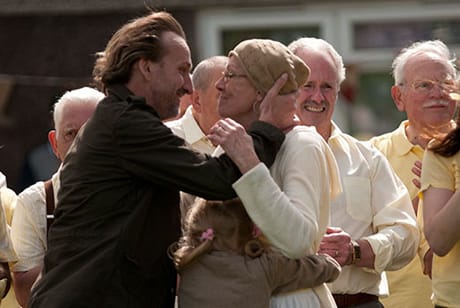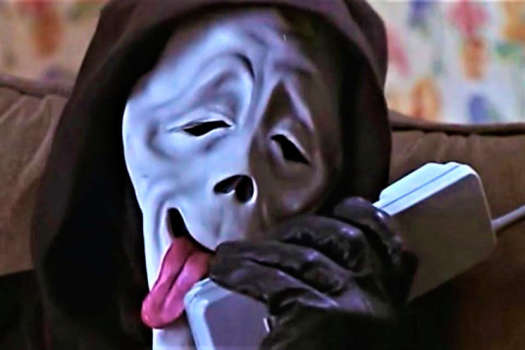Taking a break from making films about backwoods British cannibals and rapists, Paul Andrew Williams (who showed early promise with exceedingly disturbing thriller London to Brighton, in 2006) goes the Full Monty/Calendar Girls route with Song for Marion, an adult dramedy about a glee club for senior citizens.
As such, it features the requisite cutesy (read: obnoxious) scenes of old people acting youthful and kooky while singing the songs of Salt-n-Pepa and the B-52's. (It's funny because they're old and should be marinating in their own filth and watching Coronation Street.)
Understandably syrupy and vile, featuring close-ups of old people making exaggeratedly shocked faces while singing "Let's Talk About Sex," the good thing about this bit of mainstream fluff is the intensity of the love story at its core.
Terminally ill Marion (Vanessa Redgrave) practices for her community centre choir relentlessly, taking tips and lessons from the effervescent, but unlucky in love director, Elizabeth (Gemma Arterton). Her curmudgeonly husband, Arthur (Terence Stamp), doesn't understand her preoccupation with using her final life energy on singing, trying to coerce her to stay at home, even going so far as to shout profanities at the senior's choir for showing up on their lawn to sing a song after Marion does a stint in the hospital.
No one understands Marion's affection for her surly, stubborn husband, but at home, he shows her a tenderness that only she can appreciate, which is why Marion's rendition of Cyndi Lauper's "True Colors" is a profoundly touching cinematic moment that sets the tone for the latter half of the movie, wherein Arthur begins to evaluate his approach to life.
What Williams has done is take a humdrum, generic Brit cinematic template and focused on the humanity beneath the dodgy, banal, broad comedy. Even Elizabeth's inability to relate to people her age holds a bit of rawness that's quite edgy for this sort of template.
What this demonstrates is that Williams' background in making films about genuinely abhorrent people has given him enough balance to make human beings out of cutesy archetypes.
(eOne)As such, it features the requisite cutesy (read: obnoxious) scenes of old people acting youthful and kooky while singing the songs of Salt-n-Pepa and the B-52's. (It's funny because they're old and should be marinating in their own filth and watching Coronation Street.)
Understandably syrupy and vile, featuring close-ups of old people making exaggeratedly shocked faces while singing "Let's Talk About Sex," the good thing about this bit of mainstream fluff is the intensity of the love story at its core.
Terminally ill Marion (Vanessa Redgrave) practices for her community centre choir relentlessly, taking tips and lessons from the effervescent, but unlucky in love director, Elizabeth (Gemma Arterton). Her curmudgeonly husband, Arthur (Terence Stamp), doesn't understand her preoccupation with using her final life energy on singing, trying to coerce her to stay at home, even going so far as to shout profanities at the senior's choir for showing up on their lawn to sing a song after Marion does a stint in the hospital.
No one understands Marion's affection for her surly, stubborn husband, but at home, he shows her a tenderness that only she can appreciate, which is why Marion's rendition of Cyndi Lauper's "True Colors" is a profoundly touching cinematic moment that sets the tone for the latter half of the movie, wherein Arthur begins to evaluate his approach to life.
What Williams has done is take a humdrum, generic Brit cinematic template and focused on the humanity beneath the dodgy, banal, broad comedy. Even Elizabeth's inability to relate to people her age holds a bit of rawness that's quite edgy for this sort of template.
What this demonstrates is that Williams' background in making films about genuinely abhorrent people has given him enough balance to make human beings out of cutesy archetypes.




